Resources
Thank you to the Aging Life Care Association® for permission to share this information. You may learn more about Aging Life Care™ at aginglifecare.org.
Thank you to the Aging Life Care Association® for permission to share this information. You may learn more about Aging Life Care™ at aginglifecare.org.

A Conversation with Liz Barlowe, President, Board of Directors, Aging Life Care Association
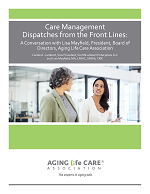
A Conversation with Liz Barlowe, President, Board of Directors, Aging Life Care Association

A Conversation with Liz Barlowe, President, Board of Directors, Aging Life Care Association

One of the hottest career trends in the next decade isn’t found in the tech sector, it can’t be outsourced overseas or automated, and it offers endless possibilities for advancement and satisfaction.

For aging adults with physical and cognitive limitations who wish to remain in the familiar environment of their own home, paid in-home care workers often provide the solution. Understanding the differences in care providers and the roles and obligations of hiring are essential in creating a positive experience for all involved.
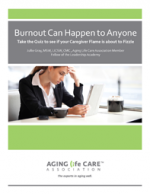
Caregiving is difficult and exhausting work. If you don’t take time to set limits on what you can do and when, and create balance in your life, you may begin to suffer from a condition called “burnout.”
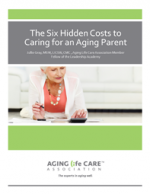
Caregiving for an aging loved one isn’t all doom and gloom. The rewards of caregiving are real, but so are the hidden costs.
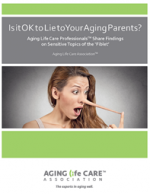
From our earliest days we are taught never to lie, especially never to our mother or father. However, a survey of Aging Life Care™ experts reveals that telling a “fiblet” can actually be therapeutic when telling painful truths to aging parents with a cognitive impairment such as Alzheimer’s Disease.
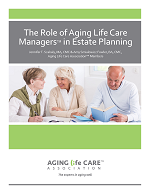
With the increased number of older adults in our society and the changing landscape of family systems, there is a growing need for an estate planning team to include the professionals who can make client-specific recommendations related to healthcare – Aging Life Care Managers™ (also known as geriatric care managers).
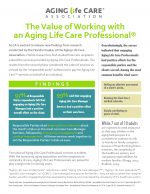
Here is a downloadable flyer highlighting the results from the second phase of the Florida Chapter Research on the value of services as viewed by the “responsible party” authorized to pay for Aging Life Care™ services on behalf of an individual.

Is it ever right to lie to a parent who has dementia*? It’s a question nearly all families struggle with during the course of the disease. We’d probably all agree that in most cases, telling the truth is best. But honesty is not a black and white matter in dementia care – it is wrapped in shades of gray.

A reminder may be in order that equilibrium is the key to living well as we divide our time among the needs of our parents, children, partners, jobs, and ourselves. The pull to care, or over care, often knocks that balance of its feet. Download a copy of this eBook and discover six steps that will help bring balance back to your life as a caregiver.

This e-book covers some of the aspects of getting care when the time comes, how to get that help, and how your family can arrange for help when you might not be able to make some decisions for yourself. It shares stories to demonstrate and bring to life these issues.